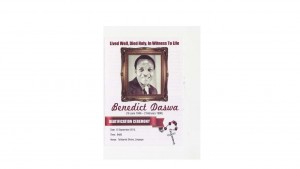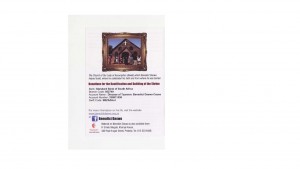Global Catholic News
Confirmation and Evangelization

CONFIRMATION AND EVANGELIZATION by Bishop Robert BarronFebruary 16, 2016.
Just a few days ago, I had the enormous privilege of performing my first confirmation as a bishop. It took place at Holy Cross Parish in Moor Park, California, a large, bustling, and bi-lingual parish in my pastoral region. I told the confirmandi—and I meant it—that I would keep them in my heart for the rest of my life, for we were connected by an unbreakable bond. In preparation for this moment, I was, of course, obliged to craft a homily, and that exercise compelled me to do some serious studying and praying around the meaning of this great Sacrament. .
It is sometimes said that Confirmation is a sacrament in search of a theology. It is indeed true that most Catholics could probably give at least a decent account of the significance of Baptism, Eucharist, Confession, Matrimony, Holy Orders, and the Anointing of the Sick, but they might balk when asked to explain the meaning of Confirmation. Perhaps they would be tempted to say it is the Catholic version of a Bar Mitzvah, but this would not even come close to an accurate theological description.
A survey of the most recent theologizing about Confirmation—the Documents of Vatican II, the Catechism of the Catholic Church, the 1983 Code of Canon Law, etc.—reveals that this is the sacrament of strengthening, as the term itself (“confirmare” in Latin) suggests. First, it strengthens baptized people in their relationship with the Lord Jesus and then it further strengthens them in their capacity to defend and spread the faith. The roots of it, of course, are in the great day of Pentecost when, through the descent of the Holy Spirit, eleven timorous and largely uneducated men became fearless evangelists, ready and able to spread the Gospel far and wide. Keep in mind that to proclaim Jesus publicly in that time and place was to take one’s life in one’s hand—and the disciples knew it. And yet, on the very day of Pentecost, they spoke out in the Temple and in the public squares of Jerusalem. With the exception of John, they all went to their deaths boldly announcing the Word. I told those I confirmed that they are, in a certain sense, successors of those first men upon whom the Holy Spirit descended and that they have the same fundamental task. Their Confirmation, I further explained, is therefore not really for them; it is for the Church and the wider world..
Now what makes this transformation possible is the third person of the Holy Trinity, who comes bearing a variety of powers, which the Church calls the gifts of the Holy Spirit. These include wisdom, knowledge, understanding, fortitude, counsel, piety, and fear of the Lord. In order to understand these more fully, we must keep in mind their relationship to evangelization and apologetics, to spreading and defending the faith. As I have argued often, a dumbed-down, simplified Catholicism is not evangelically compelling. We have a smart tradition, marked by two thousand years of serious theologizing by some of the masters of Western thought: Origen, Augustine, Jerome, Anselm, Bonaventure, Thomas Aquinas, John Henry Newman, G.K. Chesterton, and Joseph Ratzinger. If one is going to defend the Catholic faith, especially at a time when it is under assault by many in the secular culture, one had better possess (and cooperate with) the gifts of wisdom, knowledge, and understanding.
In order to be an effective evangelist, one also needs the spiritual gift of fortitude or courage. Will the defense of the faith stir up opposition? Watch the news, read the papers, and above all surf the Internet, and the question answers itself. It would be tempting indeed to withdraw from the arena and cultivate one’s faith privately, but confirmed people, endowed with fortitude, are meant to be soldiers of Christ, engaged in the fight. Some folks suggest that this phrase should not be used as it evokes the terrors of religious violence. However, the struggle of a soldier of Christ is to resist violence, not with the weapons of worldliness but with the weapons of the Spirit—peace, patience, kindness, and forgiveness. Does evangelization put the evangelizer in harm’s way? Just ask Peter, Paul, Thomas More, Maximilian Kolbe, and Charles Lwanga. But also consult anyone who has been insulted, joked about, mocked, or excluded because of his faith in Christ. The gift of fortitude empowers the confirmandi to stay in the arena.
Those who would spread and defend the faith also require the gift of counsel, which is the capacity to discern right from wrong, to know what God wants us to do in any given situation. As we move through the day, we perform hundreds of acts. Are we motivated primarily by the worldly desires for wealth, pleasure, power, self-protection, and honor; or are we motivated by a desire to please God? Counsel enables one to make the right moral decisions for the right reason. It is precisely this holiness, this consistent option to follow the will of God, that makes a person radiant and compelling to others—and hence evangelically persuasive.
Finally, the confirmed evangelizer needs the spiritual gifts of piety and fear of the Lord. Though these terms carry a somewhat fussy connotation, they in fact name something strong and bracing. They designate the capacity to place God at the absolute center of one’s life, to worship God alone. The person of piety and genuine fear of the Lord (respect for God), does not run after every passing fancy, or devote herself to a variety of worldly goods; rather, her heart is set upon God alone, and every other passion or interest in her life is related to that central value. This right ordering of the self conduces toward integrity, and integrity of life makes a person saintly and deeply attractive.
I reminded those I confirmed that their Confirmation was meant to set them on fire with the Holy Spirit, precisely so that they in turn can set the world on fire. Once again, the gifts that they received were not for them.
The Pope App
Your gateway to the latest news and information on Pope Francis.
ALL ACCESS • FREE APP • available for your mobile smartphone
The Pope App gives you the latest news and information on the Pope as produced by the Vatican’s own media services and featured on News.va, the official network hub of Vatican communication.
The app allows you to follow live streaming of papal events, receive notifications of important events, view papal photos, videos, @Pontifex tweets, full texts of homilies and speeches, a calendar of events and links to all the Vatican media.
The app also allows you to visit the Vatican live through the various webcams located in St. Peter’s Square and other areas nearby. All media contents are easily shareable and can be saved for later viewing. The language of content can be changed easily within the app to English, Spanish, French, Italian or Portuguese.
The Pope App and News.va are services provided by the Pontifical Council for Social Communications (www.pccs.va), in cooperation with the media offices of the Holy See, including, Fides News Agency, L’Osservatore Romano, the Holy See Press Office, the Vatican Television Center (CTV), Vatican Radio, and the Internet Office of the Holy See.
We welcome your feedback. Please send any feature requests or bug reports to:info@news.va.
The app is available from the following app stores.
Francis Thanks South African Martyr for Courageous Witness
Beatification Mass of Samuel Benedict Daswa Presided by Cardinal Angelo Amato
In his Angelus address, Pope Francis remembered the beatification of South Africa’s first blessed martyr, Samuel Benedict Daswa.
The beatification Mass took place in Blessed Daswa’s hometown of Limpopo and was presided by Cardinal Angelo Amato, Prefect of the Congregation for the causes of Saints.
After a severe lightning storm on January 25th, 1990 which caused a number of thatched huts in his village to catch fire, the local council agreed to consult a traditional healer to identify the witch who was responsible for the burnings. A monetary contribution was agreed on to pay the person.
Daswa argued strongly against blaming witches for causing lightning strikes, arguing that it was natural phenomenon. When the decision was upheld, Benedict refused to pay the contribution, saying that his Catholic faith prevented him from taking part in anything connected with witchcraft.
On February 2nd, 1990, Daswa was ambushed by a mob, then stoned and beaten to death. According to witnesses, his final words were “God, into your hands receive my spirit.”
Recalling his life and martyrdom, Pope Francis said that Blessed Daswa showed consistency in courageously “taking on Christian attitudes and refusing worldly and pagan customs.” He also remembered all those who, like the South African martyr, are persecuted for the faith.”
“May his witness especially help families to spread the truth and charity of Christ, and may his witness, united with the witness of so many of our brothers and sisters – youth, elderly, boys and girls, children – all persecuted, kicked out, and killed for announcing Jesus Christ,” he said.
Concluding his remarks, Pope Francis called on the faithful to thank Samuel Benedict Daswa and all the Church’s martyrs and asked “that they intercede for us.”
(September 13, 2015) © Innovative Media Inc.





